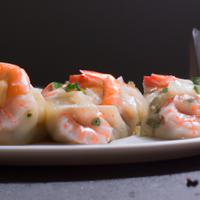
1 serving (50 grams) contains 80 calories, 6.0 grams of protein, 2.0 grams of fat, and 10.0 grams of carbohydrates.

Log this food in SnapCalorie

Nutrition Information
Calories |
379.1 | ||
|---|---|---|---|
% Daily Value* |
|||
| Total Fat | 9.5 g | 12% | |
| Saturated Fat | 2.4 g | 12% | |
| Polyunsaturated Fat | 0 g | ||
| Cholesterol | 142.2 mg | 47% | |
| Sodium | 947.9 mg | 41% | |
| Total Carbohydrates | 47.4 g | 17% | |
| Dietary Fiber | 2.4 g | 8% | |
| Sugars | 4.7 g | ||
| protein | 28.4 g | 56% | |
| Vitamin D | 0 mcg | 0% | |
| Calcium | 94.8 mg | 7% | |
| Iron | 2.4 mg | 13% | |
| Potassium | 237.0 mg | 5% | |
* Percent Daily Values are based on a 2,000 calorie diet. Your daily values may be higher or lower depending on your calorie needs.
Food Attributes
Source of Calories
About Shrimp dumplings steamed
Shrimp dumplings, also known as har gow, are a hallmark of Cantonese dim sum cuisine. These delicacies feature a thin, translucent wrapper made from wheat starch, expertly steamed to encase a flavorful filling of minced shrimp, often mixed with hints of ginger, sesame oil, and seasonings. Originating from Guangdong, China, they are cherished for their delicate texture and vibrant flavor. Nutritionally, shrimp offers a lean source of high-quality protein and key nutrients like selenium and vitamin B12, while the steaming process minimizes added fats. However, the dumpling wrappers can be a source of refined carbohydrates, and sodium levels may be elevated due to seasoning or soy sauce accompaniments. Moderation is key for those watching their calorie or sodium intake. Overall, shrimp dumplings blend cultural tradition with a balance of health benefits and indulgent flavor, making them a popular choice among dim sum enthusiasts worldwide.



